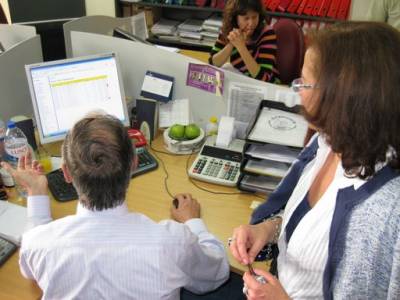Addressing BTOM Complexities: Challenges in Shipping Supplies to UK Ports
By Steeve Eldred, Vice Chair of the OCEAN Veterinary Working Group
In a recent discussion, Steeve Eldred, Vice Chair of the OCEAN Veterinary Working Group, delves into the intricate challenges posed by the UK's Border Operating Model (BTOM) on shipping supplies of Products of Animal Origin (POAO) to UK ports from a ship supply perspective. The BTOM, introduced in August 2023, has imposed stringent regulations that complicate what used to be routine deliveries. Eldred explains how these new requirements, ranging from health certificates to physical inspections, impact the maritime industry and what potential solutions could ease the burden.
Understanding Ship Supplies: What Does It Mean?
When we refer to "ship supplies," we mean goods intended for consumption on board vessels. These supplies often include various Products of Animal Origin (POAO) combined in one truck, sealed and cleared by customs before export from the EU.
The BTOM Challenge: Why Delivery to UK Ports is Nearly Impossible
The UK's Border Operating Model (BTOM), introduced in August 2023 and enacted on 31 January 2024, regulates how food products that are imported or transiting through Great Britain are to be handled. The implementation occurs in several stages with critical milestones:
- January 31, 2024: Health certificates required for medium-risk animal products, plants, and certain foods from the EU.
- April 30, 2024: Documentary and risk-based checks for these goods.
- October 31, 2024: Safety declarations for all EU imports.
Critical Requirements for Ship Supplies
Great Britain Health Certificate: Local EU veterinary authorities oversee the meticulous process of issuing these certificates. Each certificate must detail the specific animal products being transported, affirming their compliance with UK health standards. The challenge arises when products are purchased from EU partners without accompanying certificates, as veterinarians can only issue a new health certificate with this documentation. This bureaucratic hurdle makes the procurement of necessary certificates time-consuming and expensive, often resulting in delayed shipments.
Pre-notification in IPAFFS: The Import of Products, Animals, Food, and Feed System (IPAFFS) is the UK's online portal for pre-notifying authorities about incoming consignments. Shippers must enter detailed information about their goods, including the type and quantity of animal products, the origin, and the intended port of entry. This pre-notification is crucial for scheduling inspections and ensuring compliance with UK import regulations. However, the administrative burden of accurate and timely submissions adds another layer of complexity to the logistics process.
Physical Inspections: Upon arrival at UK ports, up to 30% of shipments are subject to physical inspections by border officials. These inspections involve thoroughly examining the goods to verify that they meet UK standards and are correctly documented. While necessary for food safety and compliance, these inspections can cause significant delays, especially if the goods are perishable and the vessel is waiting to depart. The risk of failing an inspection or missing a ship's departure due to delays further complicates the logistics of delivering ship supplies.
Under the Current BTOM Requirements, Sending SPS Goods to UK vport calling Vessels is Risky and Often Impossible.
Shipping products of animal origin (POAO) to UK ports under the Border Target Operating Model (BTOM) has become increasingly challenging for many ship suppliers and shipowners. It is true that EU ship suppliers can benefit from a specific "ship supply" export health certificate (EHC), which may initially seem to have fewer requirements than a traditional one. However, a closer examination reveals they impose the same, if not more stringent, conditions on ship supplies. This is simply unworkable.
So what is the solution?
Many Shipowners Now Avoid British Ports.
As a result of the complex regulatory landscape and the challenges the BTOM poses, many shipowners are opting to bypass British ports altogether. The unpredictability and potential delays associated with compliance issues make delivering ship supplies to UK vessels a high-risk endeavour that some maritime operators would prefer to undertake. This avoidance strategy disrupts traditional supply chains and affects the region's naval logistics efficiency.
A Potential Solution is Assessing EU Ship Supply as Low-Risk.
To address these challenges, stakeholders have proposed reassessing the risk classification of ship supplies under the BTOM. By recognising these shipments as low-risk, authorities could allow ship suppliers to transit through the UK without EHCs but in sealed trucks directly to sea-going vessels without any local market interactions. Yet, UK authorities have yet to consider these suggestions, accepting that their reluctance to change course has significant disruptions to well-established supply chains and negatively impacting economic activity and local employment at UK ports due to decreased activity.
Conclusion: The Path Forward for Ship Supplies
Shipping products of animal origin (POAO) to UK ports under the Border Target Operating Model (BTOM) has become increasingly challenging. Despite the presence of specific export health certificates for EU ship suppliers, these impose equally stringent requirements, leading to delays and increased costs.
Consequently, many shipowners now avoid British ports, disrupting traditional supply chains and affecting naval logistics efficiency.
To address these challenges, stakeholders propose reclassifying ship supplies as low-risk under the BTOM. This change could restart modern ship supply in the EU, which, without this, will effectively be dead.




